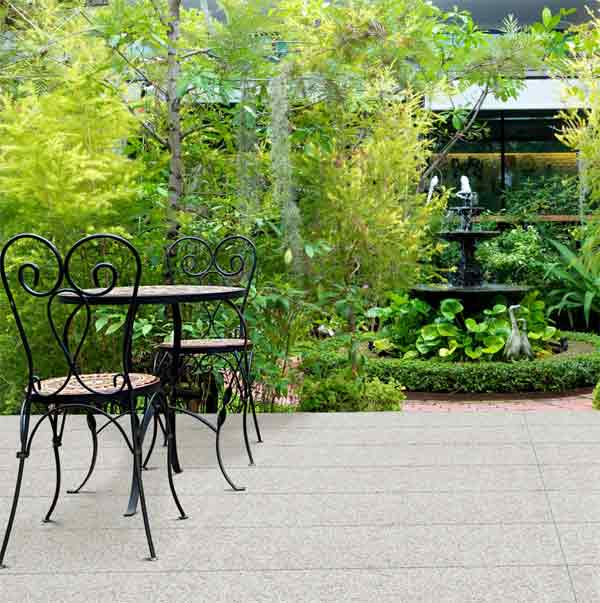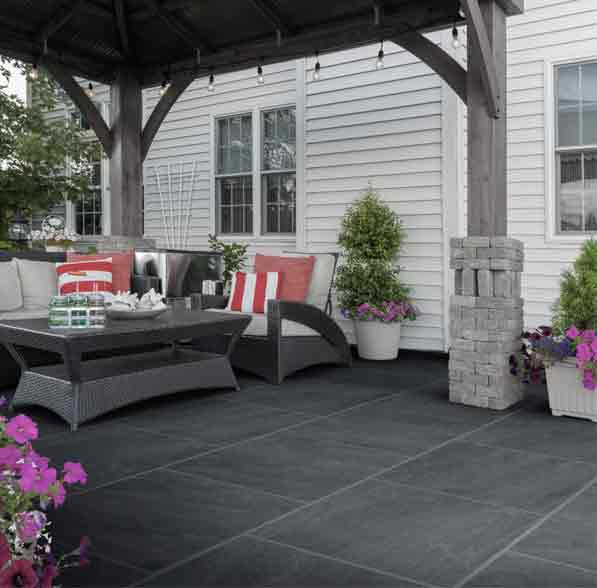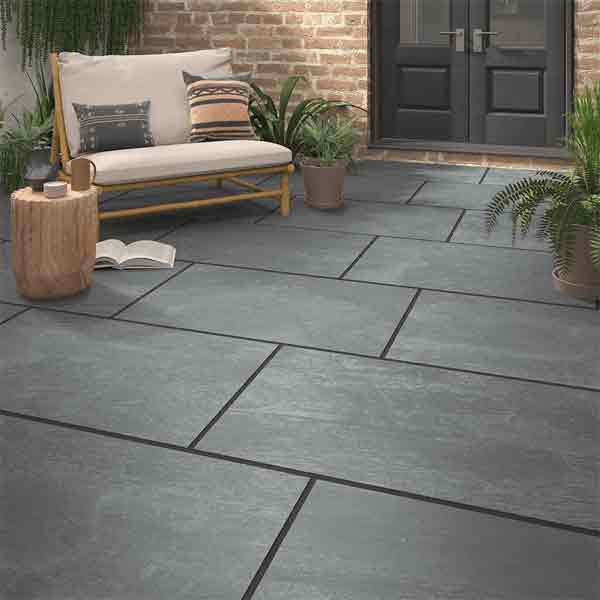Outdoor Porcelain Patio instillation
Porcelain paving is one of the most beautiful additions that can be made to any garden or patio area. There is a wide selection of porcelain patio slabs available that will complement whatever aesthetic you are aiming to create in your outdoor project.
Completely changing gardens up and down the country and gaining momentum from the “inside-outside” trend sweeping the UK – porcelain paving is quickly becoming the got to tile for that premium garden look.
FREE NO-OBLIGATION QUOTE
Enter your details and we’ll call you right back
Are there different types of porcelain paving tiles?
Porcelain paving is created by baking a mixture of clay, sand and other minerals. These are then put into a high-temperature kiln. From this, an incredibly durable and non-porous material is created; known as porcelain paving.
Unglazed Tiles
Unglazed porcelain tiles are produced by dry pigmented powdered clay that is injected into a mould and then pressed and fired. This type of production creates porcelain tiles where each tile has a different pattern. Unglazed porcelain typically doesn’t require any further treatment and sealing may not actually be required.
A structured finish can be produced by pressing powder into a patterned mould. The tile then takes on the texture of the mould. This type of external tile is extremely hard wearing and is ideal for both domestic and commercial application. Typically, no sealing is required

Glazed Tiles
Glazed porcelain tiles are available in gloss, matt or semi-polished form. Glazed tiles can be created through several methods and the glazes can have either a solid colour or a pattern with a gloss or matt finish. After a porcelain tile has been glazed, it doesn’t require any further treatment or sealing.

What are the benefits?
The benefits of porcelain paving begin with its properties: the materials used and the way it’s manufactured. This combination makes an incredibly strong product, being pressed in a raw state to become solid and then fired at very high temperatures (1200 degrees). This creates a highly dense and consistent product that out performs natural stone in relation to long-term appearance and durability.
Once installed and in use, porcelain paving is virtually maintenance free; it doesn’t stain, is highly resistant to scratches and is UV and frost-proof.
ENQUIRE FOR A FREE QUOTE
Fill in the form below to schedule a FREE quote.
Can a porcelain patio add value to your house?
A study carried out by Sellhousefast.uk discovered that homeowners who improve their garden could reap rewards when it comes to selling.
In a list of ten improvements that can be made to outside space, installing a decent quality patio came in second to top (behind a garden shed), with 76% of respondents saying that it is a feature they look out for. Overall, a nice garden could add as much as 20% to the value of the home according to the study.



The instillation process.
From a trade installation point of view, you don’t have to be a specialist to install porcelain paving. The techniques are similar to those for traditional paving products. The main difference is the need to use a slurry paste/primer before laying the paving, which avoids the product pulling away from a concrete bed when drying.
The paving can also be installed to accommodate different levels in a garden. This means it can be installed on supporting pedestals that, historically, have been used only in commercial applications, such as rooftop gardens in hotels.
The four main types of Porcelain Paving?
1. Unglazed porcelain tiles
Unglazed porcelain tiles are produced by dry pigmented powdered clay that is injected into a mould and then pressed and fired. This type of production creates porcelain tiles where each tile has a different pattern. Unglazed porcelain typically doesn’t require any further treatment and sealing may not actually be required.
A structured finish can be produced by pressing powder into a patterned mould. The tile then takes on the texture of the mould. This type of external tile is extremely hard wearing and is ideal for both domestic and commercial application. Typically, no sealing is required.
2. Glazed Porcelain Tiles
Glazed porcelain tiles are available in gloss, matt or semi-polished form. Glazed tiles can be created through several methods and the glazes can have either a solid colour or a pattern with a gloss or matt finish. After a porcelain tile has been glazed, it doesn’t require any further treatment or sealing.
3. Digitally Printed Porcelain Tiles
Digitally printed porcelain is another type of glazed porcelain. This is the latest method of tile production which allows for natural materials to be photographed and digitally printed onto the tile to create images that are natural in appearance. These tiles do not need to be sealed.
4. Full Bodied, Double Loaded, and Colour Bodied Porcelain Tiles
Full bodied, double loaded and colour bodied porcelain tiles are a type of tile where the colour and pattern of the tile runs all the way through the biscuit, with a single colour from the surface to the base of the tile. Double loaded tiles are made by compressing two layers of clay together. These tiles are great for high traffic areas.
Porcelain v natural stone, what’s the difference?
No one can deny the beauty of natural stone paving. However, we genuinely believe that porcelain paving is an even more appealing and longer lasting paving option.
We feel that porcelain flags boast characteristics that make it superior to natural stone, for indoor or outdoor installation. Unlike natural stone, porcelain paving slabs require minimal maintenance. They are moisture resistant without sealant and they don’t impact the environment as much as natural stone paving either.
– Natural stone paving varies in porosity. This means it is very unlikely that you will find a natural stone paving option that is completely non-porous. One of the main benefits of choosing porcelain outdoor slabs over natural stone paving is that porcelain has very low porosity. In fact, research shows that porcelain garden slabs absorb less than 0.05% surface water.
Due to the fact that porcelain patio tiles are highly water resistant, they are also moisture resistant. The great thing about this, is that it means porcelain slabs will not stain. All the cleaning that will be required is a quick wipe over with some warm and soapy water. This will then remove any debris or organic matter such as grass, soil, leaves, bird droppings, etc from your porcelain flags.
ENQUIRE FOR A FREE QUOTE
Fill in the form below to schedule a FREE quote.
Why choose outdoor porcelain paving?
As with all paving options, you need to consider the pros and cons to ensure you are making the right decision for your outdoor paving area. Below we have listed the pros and cons of porcelain paving.
Porcelain paving is becoming an increasingly popular paving solution for outdoor living areas. Porcelain outdoor slabs have a number of attractive advantages when compared to other paving options. However, there are some downsides to porcelain garden slabs too. We hope our rundown of the pros and cons of porcelain paving will help you make the right decision for your outdoor living space.
The Pros of Porcelain Paving
- Porcelain patio slabs offer low porosity. This means that they are far less absorbent than natural stone, for example. This makes porcelain patio slabs significantly more resistant to moisture, damage, staining, etc.
- Porcelain patio tiles are low maintenance. Due to their low porosity and outstanding durability it means that porcelain patio tiles require virtually no maintenance at all. In fact, unlike other paving solutions, porcelain patio tiles never have to be sealed. All they need is an annual jet wash to keep them looking great.
The Cons of Porcelain Paving
- Porcelain flags will often cost more than other paving options. However, this does depend on the quality of the product you are buying. As a general rule, you can expect to pay more for porcelain than any other paving materials. It is worth noting that this is only the initial outlay that costs more though. When you compare the lifetime, maintenance requirements and other key performance indicators, you will see the long-term cost is lower.
- Porcelain outdoor slabs can be more difficult to cut as they are harder than other paving materials. It can be done, but specialist cutting equipment is required. This is why some installers may be more reluctant in laying porcelain paving, especially if they are less experienced in this area.
- Porcelain paving slabs offer a very different appearance to natural stone paving. While they are still beautiful, if you’re a big fan of the natural stone paving look, then porcelain paving slabs probably aren’t the right paving product for you. That said, ,any of the porcelain paving products we sell have been designed to look like natural stone, on top of the additional benefits, this may swing it for you.
FREE NO-OBLIGATION QUOTE
Enter your details and we’ll call you right back
Call 07762099804
Stunning Landscapes
25 Hamer Street,
Bury,
Manchester,
M262RS

